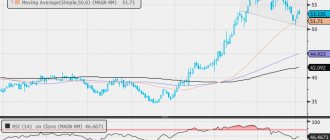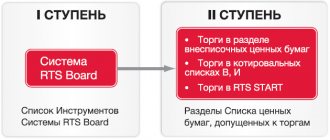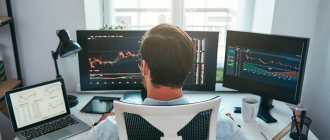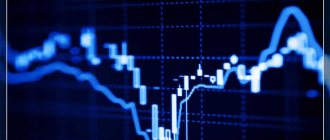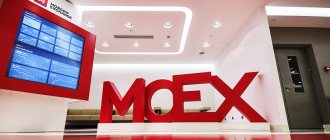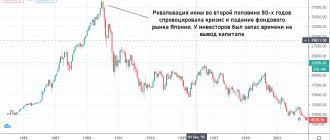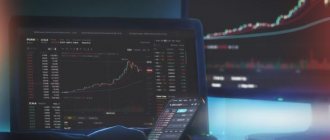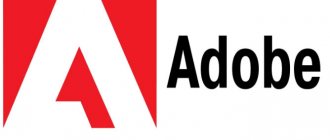Greetings to enthusiastic readers.
Today we will talk about MSCI Russia. I'll tell you what the index is and who publishes it, why it's important to track it, and what strategies you can use to make money on it. I will provide current data on the composition and structure of the instrument, and also show a calculation methodology with which each investor will be able to roughly analyze future changes in MSCI Russia.
I will also explain when large-scale rebalancing occurs and where you need to look in order to react as quickly as possible to changing situations. This information will be extremely useful for anyone who trades in the stock market, be it long-term investors or active traders.
Which companies are included in the index?
Here is the current composition of the list of companies included in MSCI Russia as of June 2021. Data taken from the provider’s official website: www.msci.com
| MSCI code | Issuer's name | Ticker | Weight, % |
| 1896804 | Sberbank of Russia | SBER | 19,32 |
| 1884205 | Gazprom | GAZP | 17,7 |
| 1874804 | Lukoil | LKOH | 15,27 |
| 3241302 | Novatek (GDR) | NVTK | 8,47 |
| 2056003 | Tatneft | TATN | 8,29 |
| 2491705 | MMC Norilsk Nickel | GMKN | 6,3 |
| 3481902 | Rosneft | ROSN | 3,53 |
| 6071002 | Magnet | MGNT | 2,4 |
| 1885703 | Surgutneftegaz (private) | SNGS_p | 2,03 |
| 2375301 | MTS (ADR) | MBT.N | 1,9 |
| 3170002 | X5 RETAIL GROUP (GDR) | FIVEDR | 1,8 |
| 6994201 | Alrosa | ALRS | 1,65 |
| 2517402 | Severstal | CHMF | 1,59 |
| 3099803 | NLMK | NLMK | 1,49 |
| 1885706 | Surgutneftegaz (common) | SNGS | 1,3 |
| 6971602 | Polymetal | POLY | 1,11 |
| 6187102 | Inter RAO | IRAO | 1,08 |
| 7177401 | Pole gold | PLZL | 1,05 |
| 3692203 | VTB | VTBR | 0,91 |
| 7143701 | Moscow Exchange | MOEX | 0,86 |
| 3692701 | MMK | MAGN | 0,73 |
| 6971101 | Phosagro | PHOR | 0,68 |
| 2788702 | TRANSNEFT PREF (RUB) | TRNF_p | 0,54 |
VTBE share price
VTBE BTIF was launched just recently - at the end of July 2019. Therefore, the cost of the share is not far from the initial value - more precisely, it even dropped.
The starting price of a share is 650 rubles. At the time of writing, 1 share of VTBE cost 623 rubles. Therefore, this is the minimum amount for purchase (excluding brokerage commissions).
Index history
Currently, MSCI Russia indicators are calculated by the Morgan Stanley financial group. But 1968 can be considered the starting point for world benchmarks for different stock markets.
The first calculations of non-standard indices were carried out by the company Capital International; it published instruments under the names: Canada, Germany, French, Italy, Great Brittan, which corresponded to the calculation based on the dynamics of shares of large companies in these countries.
liked this idea and wanted to buy the rights to publish these instruments, but they were refused. Then the financial group decided to make its own analogue, which gained quite a lot of popularity among investors and analysts.
And then, in 1986, the two providers continued negotiations on a franchise for calculating indices, and Morgan Stanley managed to obtain the rights to all areas.
Later, in 2007, the rating agency MSCI, Inc. was spun off. from the general financial group and this structure independently carried out the placement of shares on the stock exchange.
The MSCI Russia direction is included in the so-called group of markets with developing economies (MSCI Emerging markets).
Expenses
Management fees
Owners of the BTBE mutual fund will pay three types of commissions:
- in favor of the management company – no more than 0.52% of the NAV for the year;
- in favor of the depositary, auditor and other infrastructure – no more than 0.18%;
- other expenses for maintaining the fund – no more than 0.1%.
The total commission amount is thus about 0.8% per year. The investor does not need to pay anything separately; the commission is already “built into” the price of the share.
When buying and selling shares on the stock exchange, you will have to pay a standard commission to the broker. Its size depends on your tariff.
However, in reality the actual commission is slightly higher. The IEMG ETF, for which VTBE acts as a pad, charges a management fee of 0.14% per annum of NAV.
That is, if you invest directly in an ETF (not through a mutual fund), you will pay an order of magnitude less. If you buy a mutual fund, then pay a commission of 0.8% to the management commission of the fund itself - another 0.14%. The final commission is 0.94%.
And here’s another interesting article: Invest money at interest: where, why and at what rate
Taxes
When selling a share, you will need to pay a 13% tax if two conditions are met:
- a positive effect from investment has been achieved (the share has risen in price by at least 1 ruble);
- less than 3 years have passed since the purchase of the first share.
Thus, in order not to pay taxes, you need to hold shares for more than 3 years. In this case, you will receive a tax deduction of up to 3 million rubles for each year of ownership of shares. Those. after three years of owning shares, you will immediately receive a deduction of up to 9 million rubles, then 12, etc.
If you buy ETF VTBE shares on an individual investment account (and this is possible), then it has its own tax regime, and the standard deduction will not be applied to the asset.
Types of index
In addition to the main MSCI Russia Standard index, there is another instrument called Russia 10/40. It is built on the basis of the basic Russia Standard, but with some additional conditions that allow it to comply with European investment management standards for funds.
Here's the thing: funds in the EU are prohibited from investing more than 10% of their total capital in the shares of one company, provided that, collectively, such securities do not occupy a share exceeding 40% of the fund's total assets. In other cases, the level of diversification should limit the issuer's weight in the fund's portfolio to 5%.
In this regard, MSCI Russia 10/40 reduces the shares of individual stocks, distributing their weights in proportions to 4.5 and 9%.
Cost and dynamics for all time
MSCI Russia reflects quotes of the largest Russian issuers, so its dynamics are very similar to the chart of our RTS index.
If you smooth out some volatility, you can see that since 2010, quotes have remained at the same levels. But you need to understand that the graph reflects the cost in dollars.
Fund infrastructure
Let's consider thanks to whom (more precisely, what) the fund functions in general.
The depositary of the fund (the organization that stores the shares) is CJSC VTB Specialized Depository.
Registrar (keeps records of VTBE fund shareholders) – VTB Registrar.
The auditor is Marillion LLC.
VTB Capital Investments itself acts as a market maker. It is she who will ensure the liquidity of shares on the Moscow Exchange.
As you can see, most of the companies supporting the activities of the VTBE mutual fund are in one way or another connected with the issuer. On the one hand, there are risks, on the other hand, there is the opportunity to save on maintenance. But the fact that the auditor is independent is already good.
Index calculation method
The provider does not disclose specific conditions and calculation formulas for inclusion of issuers in MSCI Russia. However, there are some guidelines that can be used.
I would like to note right away that MSCI Russia can take into account both company shares and depositary receipts. The main criterion is that they can be freely purchased by foreign investors.
Other inclusion conditions include:
- The free float valuation should be above $1.5 billion.
- The share of free float is not less than 15% of capitalization.
- Market capitalization of at least $3 billion.
MSCI Investment Insights Report 2021
We surveyed 200 institutional investors globally with assets of around $18 trillion to better understand their views on the most important investment issues. What are the most important trends for the next three to five years? What is the lasting impact of COVID-19? And what is their latest thinking on factor investing, risk management, and diversity?
Learn More
Key MSCI Emerging Markets Indexes
Building on this index, MSCI has developed various derived indexes including indexes capturing different size segments like Investable Market Indexes (IMI), large-cap, mid-cap, small-cap and all-cap as well sector, style, ESG and Factor indexes .
We use cookies to optimize site functionality and give you the best possible. Learn More
Pros and cons of the index
Among the advantages of MSCI Russia are:
- Diversification across the largest and most liquid stories on the Russian market.
- Effective accounting of issuers' shares.
- Dynamic rebalancing.
- An excellent indicator of the state of the Russian stock market.
- The main benchmark used by the world's largest funds.
I will name the disadvantages:
- There is no specific calculation formula, which makes forecasting difficult.
- Does not take into account any individual characteristics of companies from a fundamental point of view.
Brief characteristics of the fund
As the name suggests, the VTBE mutual fund invests not in one industry or one economy, but in several countries at the same time. The fund's description states that it is diversified across 2,450 small, mid and large capitalization companies from a dozen countries. Well, diversification really looks great; we’ll look at more details about where the fund invests later.
Fund shares are traded on the Moscow Exchange and can be bought and sold at any time. Formally, the commission is only 0.8%, but, as we will see in practice, in reality it is higher.
VTBE does not pay dividends; all payments are reinvested. On the one hand, this is bad - investors will not receive “real money”, on the other hand, dividends allow the fund to receive additional funds and increase the volume of assets, so that the share will rise in price. In fact, dividends will help VTBE's price rise.
How and where to make money on the index
The most obvious way is to purchase structured products based on the MSCI Russia index.
You can use foreign instruments:
- ERUS;
- db x-trackers MSCI Russia Capped UCITS 1C;
- KIM KINDEX MSCI Russia Synth;
- iShares MSCI Russia Adr/Gdr UCITS.
Such an ETF is not yet available on the Russian market. However, Finex provides the opportunity to buy the RTS index through the “FinEx Russian RTS Equity UCITS ETF” instrument. This is practically an analogue of MSCI Russia.
But you can use other tactics. By analyzing the market dynamics of Russian stocks, you can try to predict which issuers will increase or decrease their weight on the MSCI Russia rebalancing, and based on this data, build a speculative trading strategy.
Warning
Expert opinion
Vladimir Silchenko
Private investor, stock market expert and author of the Capitalist blog
Ask a Question
You should only trade on real markets and through licensed brokers. Almost all binary options firms are fraudulent structures that play against their clients using various schemes for taking money. There is no need to trust your funds to just anyone in the hope of getting rich quick. This always leads to disastrous consequences!
Best brokers
Here you can see a list of reliable brokers with optimal conditions.
Reliable Russian brokers
| Name | Rating | pros | Minuses |
| Finam | 8/10 | The most reliable | Commissions |
| Opening | 7/10 | Low commissions | Imposing services |
| BKS | 7/10 | The most technologically advanced | Imposing services |
| Kit-Finance | 6.5/10 | Low commissions | Outdated software and user interface |
Growth Leaders
| № | Fund | Price | Meas., points | Change, % | Volume (pcs.) |
| 1 | iShares S&P MidCap 400 Index Fund (IJH) | 264,33 | 18,099 | 40,51 | 1 965 317 828,00 |
| 2 | iShares Russell 2000 Value Index Fund (IWN) | 169,45 | 30,839 | 39,94 | 969 278 689,00 |
| 3 | Vanguard Consumer Discretionary ETF (VCR) | 295,75 | 12,214 | 32,19 | 34 380 601,00 |
| 4 | SPDR S&P 500 Index Fund (SPY) | 394,09 | 7,595 | 27,82 | 158 184 027 566,00 |
| 5 | DIAMONDS DJIA (DIA) | 328,31 | 9,102 | 27,39 | 9 854 533 048,00 |
| 6 | iShares S&P SmallCap 600 Index Fund (IJR) | 115,01 | 28,661 | 25,62 | 1 639 877 843,00 |
| 7 | iShares Russell 3000 Index Fund (IWV) | 237,99 | 9,310 | 20,27 | 74 684 425,00 |
| 8 | Vanguard Total Stock Market ETF (VTI) | 207,36 | 9,051 | 17,21 | 3 119 903 502,00 |
| 9 | Allianz SE | 115,71 | 10,780 | 11,26 | 342 938 747,00 |
| 10 | iShares S&P GSTI™ Networking Index Fund of iShares Trust | 66,4 | 16,675 | 9,49 | 3 926 757,00 |
Interesting facts about the index
Many large foreign funds operating billions of dollars literally copy the MSCI Russia portfolio.
Therefore, astute investors always monitor possible changes in the index, because a change in the weight of the issuer can lead to a large inflow or outflow of capital from the trading instrument.
What affects the price
Since the MSCI Russia index is a reflection of our stock market, its value may be influenced by:
- General economic geopolitical factors (including possible sanctions).
- Change of composition and percentage of shares in the index.
- Indicators of individual companies that occupy a large weight in MSCI Russia.
- The balance of power among trends in Russia and the world.
- Other indices from the MSCI emerging markets family.
Forecast, analytics and prospects
Geopolitical factors that are difficult to predict can play a large role in determining the future dynamics of the MSCI Russia index.
If we look from the point of view of economic trends, the reduction in rates on the Russian market over the next few years will have a positive impact on the price of shares of issuers included in MSCI Russia.
Similar indexes
In addition to Russia, the emerging markets segment includes MSCI instruments calculated for other countries and regions.
| "Americas" | "Europe, Middle East & Africa" | "Asia" |
| Argentina | Egypt | India |
| Brazil | Greece | China |
| Chile | Hungary | Indonesia |
| Colombia | Poland | Korea |
| Mexico | Qatar | Malaysia |
| Peru | Saudi Arabia | Pakistan |
| South Africa | Philippines | |
| Türkiye | Taiwan | |
| United emirates | Thailand |
Development risks
Experts note that markets in developing countries not only promise high returns, but are also subject to risks. In particular, one of the risks is a higher rate of tightening of monetary policy in the United States than the market expects (so far, the Fed is planning three increases in the key rate for next year), which could lead to a flow of capital from developing countries to dollar assets, notes Sergei Suverov. “The rise in the price of money in the United States, which is gradually occurring, may provoke a market correction,” warns Khokhrin.
Emerging markets also have specific problems in specific countries, for example, authoritarianism in Turkey and populism in South Africa, possible new sanctions against Russia, a possible debt crisis in China, says Suverov. Victor Shastin also points to the high debt burden in China. “The main risk facing emerging markets is the credit multiplier in China. The number of new loans issued in the country doubled compared to 2021 and amounted to $3.64 trillion. We don't remember any economist predicting in 2021 that China's new credit issuance would more than double year-on-year in 2021, but that's exactly what actually happened. These are alarm bells,” he says.
